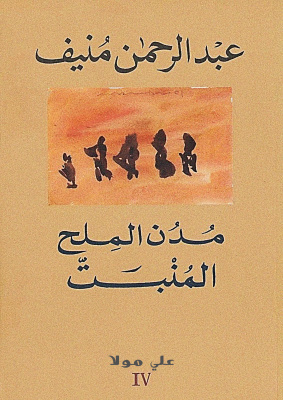Amman, Jordan: Al-Mu'assasat ul-'Arabiyat ud-Dirasat wa-n-Nashr,
2005. — 255 p. (in Arabic)
Abdel Rahman Munif (May 29, 1933 – January 24, 2004) is a Saudi
novelist. His novels include strong political elements as well as
mockeries of the Middle Easte elite classes. His work so offended
the rulers of Saudi Arabia that many of his books were banned and
his Saudi citizenship revoked.
Munif was the author of fifteen novels. The Cities of Salt quintet followed the evolution of the Arabian peninsula as its traditional Bedouin culture was transformed by the oil boom. The novels portray the history of a broad region, evoking comparisons to William Faulkner's Yoknapatawpha County. The quintet begins with Mudun al-Milh (Cities of Salt), depicting the desert oasis of Wadi al-Uyoun as it is transformed and destroyed by the arrival of Weste oilmen, a story similar to that of the disrupted village of Chinua Achebe's Things Fall Apart. Much as Achebe described the effects of the arrival of powerful missionaries on a traditional African village, so Munif chronicles the economic, social, and psychological effects of the promise of immeasurable wealth drawn from the deserts of nomad and oasis communities. The quintet continues with Al-ukhdud (1985;The Trench), Taqasim al-layl wa-al-nahar (1989; Variations on Night and Day), Al-munbatt (1989; The Uprooted), and Badiyat al zulumat (1989; The Desert of Darkness). Daniel Burt ranked the quintet as the 71st greatest novel of all time. The last two novels in the series have not been translated into English.
While he was one of the fiercest critics of Saddam Hussein and his regime, he was utterly opposed to the American invasion of Iraq and spent the last two years of his life working on non-fiction projects to oppose what he saw as renewed imperialism.
Munif was the author of fifteen novels. The Cities of Salt quintet followed the evolution of the Arabian peninsula as its traditional Bedouin culture was transformed by the oil boom. The novels portray the history of a broad region, evoking comparisons to William Faulkner's Yoknapatawpha County. The quintet begins with Mudun al-Milh (Cities of Salt), depicting the desert oasis of Wadi al-Uyoun as it is transformed and destroyed by the arrival of Weste oilmen, a story similar to that of the disrupted village of Chinua Achebe's Things Fall Apart. Much as Achebe described the effects of the arrival of powerful missionaries on a traditional African village, so Munif chronicles the economic, social, and psychological effects of the promise of immeasurable wealth drawn from the deserts of nomad and oasis communities. The quintet continues with Al-ukhdud (1985;The Trench), Taqasim al-layl wa-al-nahar (1989; Variations on Night and Day), Al-munbatt (1989; The Uprooted), and Badiyat al zulumat (1989; The Desert of Darkness). Daniel Burt ranked the quintet as the 71st greatest novel of all time. The last two novels in the series have not been translated into English.
While he was one of the fiercest critics of Saddam Hussein and his regime, he was utterly opposed to the American invasion of Iraq and spent the last two years of his life working on non-fiction projects to oppose what he saw as renewed imperialism.

